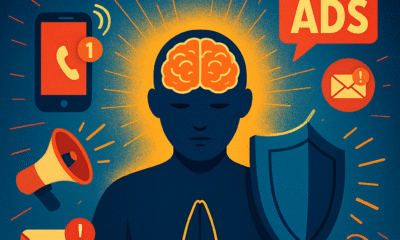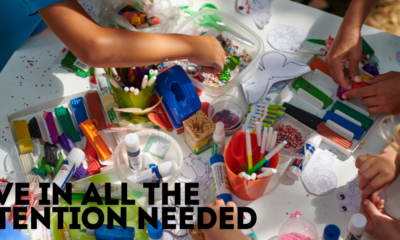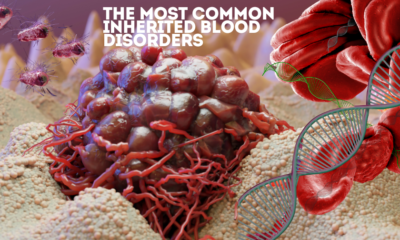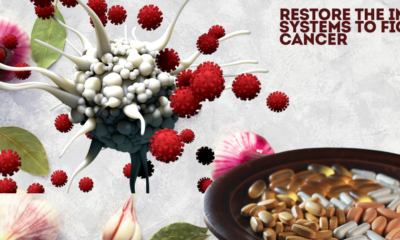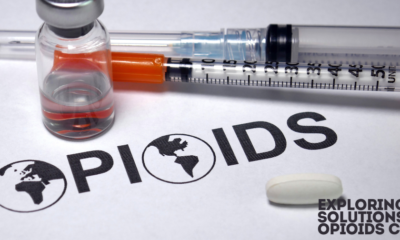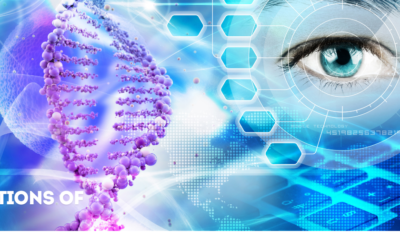Health & Fitness
Geriatric Health and Aging: Maintaining Wellness in Later Life

Aging is an inevitable process that touches every aspect of human existence, from physical capabilities to cognitive function, and even the emotional landscape. As individuals age, health challenges become more pronounced, and their overall well-being requires more focused and specialized care. This phenomenon, known as geriatric health, is the specialized branch of medicine and wellness that caters to the elderly population. Understanding the complexities of aging and how to maintain wellness in later life is critical not only for the elderly but for society at large, as populations worldwide are increasingly living longer lives due to advances in medical science and improved living conditions.
In this article, we will take a deep dive into the factors that influence geriatric health and aging. We will explore the physical, mental, and emotional aspects of aging and provide insights into the preventative measures, interventions, and lifestyle modifications that can enhance the quality of life for older adults. This will encompass physical health challenges, mental well-being, social connections, and how advances in technology and healthcare are playing a role in improving the quality of life for the elderly. By looking at the topic holistically, we can better understand the unique needs of aging individuals and the solutions that are available to support them.
The Aging Process: Understanding the Fundamentals
Aging is a natural biological process characterized by a gradual decline in physical and cognitive capacities. This decline is the result of complex interactions between genetics, environment, and lifestyle choices over a lifetime. While the aging process is unique to each individual, there are certain universal changes that occur in the human body.
Physical Changes in Aging
As individuals age, their bodies undergo significant physiological changes. These changes are not necessarily the result of illness but are rather part of the normal aging process:
Muscle Mass and Bone Density: A major aspect of aging is the loss of muscle mass (sarcopenia) and bone density (osteoporosis). This can lead to weakness, decreased mobility, and an increased risk of falls and fractures. The body’s ability to repair and regenerate tissue slows down, contributing to these declines.
Cardiovascular System: The heart and blood vessels also undergo changes with age. The heart may become less efficient at pumping blood, and the arteries can harden (atherosclerosis), increasing the risk of hypertension, heart disease, and stroke.
Metabolic Changes: Metabolism slows with age, leading to a reduced ability to process and utilize nutrients efficiently. This can contribute to weight gain, insulin resistance, and an increased risk of conditions such as type 2 diabetes.
Sensory Decline: Aging often brings a gradual decline in sensory functions, such as hearing and vision. Cataracts, glaucoma, and age-related macular degeneration are common eye conditions, while presbycusis (age-related hearing loss) affects many older adults.
Immune System: The immune system weakens with age, a phenomenon known as immunosenescence. This makes older adults more susceptible to infections, illnesses, and slower recovery from diseases.
Cognitive Changes: Memory and processing speed often slow with age, though this varies widely among individuals. While cognitive decline is not necessarily a part of normal aging, conditions such as dementia and Alzheimer’s disease are more prevalent in the elderly.
Psychological and Emotional Aspects of Aging
The psychological and emotional impact of aging is equally important as the physical changes that occur. Older adults often face significant life transitions, such as retirement, the loss of loved ones, and a decline in physical independence. These challenges can take a toll on mental health and emotional well-being.
Mental Health: Depression, anxiety, and loneliness are common mental health challenges faced by older adults. Retirement can lead to a loss of purpose or identity for some individuals, while the isolation that often accompanies aging can exacerbate feelings of loneliness and anxiety.
Cognitive Decline: Cognitive decline can vary widely from person to person. Some individuals experience mild cognitive impairment, which may not significantly impact daily life, while others may face more severe forms of dementia, such as Alzheimer’s disease, which can deeply affect their independence and quality of life.
Emotional Resilience: On the positive side, many older adults develop emotional resilience, adapting to life changes with grace and strength. The experience of aging can also bring a sense of peace and wisdom that contributes to emotional well-being.
3. Social and Environmental Factors
The social environment plays a crucial role in the aging process. The availability of social support, economic stability, and access to healthcare all contribute to the quality of life in later years. Older adults with strong social networks, economic security, and access to healthcare tend to age more successfully compared to those who face social isolation, poverty, or lack of medical resources.
Common Health Challenges in Geriatrics
Geriatric health is characterized by a number of common conditions and health challenges that need to be managed with care. While not every older adult will experience all of these issues, the likelihood of encountering one or more of them increases with age.
Chronic Diseases
Chronic diseases such as heart disease, diabetes, arthritis, and cancer are highly prevalent in older populations. These conditions often require ongoing medical management and can significantly impact the quality of life.
Cardiovascular Disease: The leading cause of death worldwide, cardiovascular disease becomes more common as individuals age. Risk factors such as high blood pressure, high cholesterol, and atherosclerosis increase with age.
Diabetes: Type 2 diabetes is more prevalent in older adults due to factors like reduced insulin sensitivity, slower metabolism, and lifestyle habits. Poorly managed diabetes can lead to complications such as kidney disease, vision problems, and nerve damage.
Arthritis: Osteoarthritis, the most common form of arthritis in older adults, results from the wearing down of joint cartilage, leading to pain, stiffness, and decreased mobility.
Cancer: The risk of developing cancer increases with age, as the body’s ability to repair DNA damage declines. Common cancers in older adults include breast, prostate, lung, and colon cancer.
Cognitive Disorders
Cognitive decline is another critical health challenge in geriatric populations. Dementia and Alzheimer’s disease are among the most concerning conditions, affecting memory, thinking, and social abilities.
Dementia: Dementia is not a specific disease but rather a collection of symptoms that affect cognitive function. It can result from a variety of conditions, including Alzheimer’s disease, vascular dementia, and Lewy body dementia.
Alzheimer’s Disease: The most common cause of dementia, Alzheimer’s disease, is a progressive brain disorder that affects memory, thinking, and behavior. It is a major health concern for older adults, with no cure currently available.
4. Mental Health Disorders
Mental health disorders in the elderly are often underdiagnosed or undertreated. Depression and anxiety are common, and they can be exacerbated by factors such as chronic illness, social isolation, or grief.
Depression: Depression in older adults may present differently than in younger individuals, often manifesting as feelings of fatigue, irritability, or physical complaints rather than sadness. Depression can severely impact quality of life, making early detection and treatment essential.
Anxiety: Anxiety disorders in older adults are frequently linked to fears about physical health, safety, or financial security. Generalized anxiety disorder and panic disorder are common and can interfere with daily activities.
Strategies for Maintaining Wellness in Later Life
While aging presents challenges, there are numerous strategies that can help older adults maintain their health and well-being. These strategies encompass medical interventions, lifestyle modifications, social engagement, and mental health support.
1. Physical Health: Exercise and Nutrition
Maintaining physical health is one of the most important factors in aging well. Regular physical activity and proper nutrition can help mitigate many of the physical changes associated with aging.
Exercise: Regular exercise can help preserve muscle mass, improve cardiovascular health, and enhance mobility. Activities such as walking, swimming, and strength training are particularly beneficial for older adults. Even low-impact exercises like yoga or tai chi can improve balance and flexibility, reducing the risk of falls.
Nutrition: A balanced diet rich in vitamins, minerals, and protein is crucial for maintaining health in later life. Nutrient-dense foods such as fruits, vegetables, lean proteins, and whole grains can help prevent malnutrition, manage weight, and lower the risk of chronic diseases.
2. Mental and Cognitive Health: Stimulation and Mindfulness
Keeping the mind sharp and emotionally balanced is just as important as maintaining physical health. There are several approaches to achieving cognitive and emotional wellness in older age.
Cognitive Stimulation: Engaging in mentally stimulating activities, such as puzzles, reading, or learning new skills, can help keep the brain active and may slow the progression of cognitive decline. Some studies suggest that lifelong learning and intellectual engagement are associated with a reduced risk of dementia.
Mindfulness and Stress Management: Practicing mindfulness and stress management techniques, such as meditation or deep breathing exercises, can promote emotional well-being. These practices help reduce anxiety and improve overall mental health, especially in the face of aging-related stressors.
3. Social Connections and Community Engagement
Social engagement plays a crucial role in healthy aging. Older adults who maintain strong social ties tend to experience better health outcomes and a higher quality of life.
Community Involvement: Participation in community activities, clubs, or volunteer work can provide a sense of purpose and belonging. Social connections help combat loneliness and isolation, which are risk factors for depression and cognitive decline.
Intergenerational Relationships: Engaging with younger generations, whether through family or community programs, can enrich the lives of older adults. These relationships provide emotional support and opportunities for knowledge exchange, benefiting both the elderly and younger individuals.
4. Access to Healthcare and Preventive Measures
Access to healthcare and preventive measures is essential for managing health challenges in later life. Regular check-ups, screenings, and vaccinations are critical components of geriatric care.
Preventive Screenings: Routine screenings for conditions such as hypertension, diabetes, cancer, and osteoporosis can catch diseases early when they are more manageable. Older adults should work with their healthcare providers to ensure they receive recommended screenings.
Vaccinations: Vaccinations, such as the flu shot, pneumonia vaccine, and shingles vaccine, are particularly important for older adults whose immune systems are less robust. These preventive measures can significantly reduce the risk of severe illness.
5. Technological Advancements in Geriatric Care
Advances in technology are transforming the way older adults receive care and manage their health. Telemedicine, wearable health devices, and smart home technologies are providing new ways for seniors to stay healthy and independent.
- Telemedicine: Telemedicine allows older adults to consult with healthcare providers remotely, reducing the need for travel and improving access to medical care, especially for those with mobility issues.
- Wearable Devices: Wearable devices that track vital signs, physical activity, and sleep patterns are becoming increasingly popular among older adults. These devices provide real-time data that can help individuals and healthcare providers monitor health trends and address issues before they become serious.
- Smart Home Technology: Innovations in smart home technology, such as fall detection systems and medication reminders, can help older adults live independently for longer by ensuring their safety and adherence to medical regimens.
The Role of Caregivers and Family in Geriatric Health
Caregivers, whether family members or professional healthcare providers, play an essential role in supporting the health and well-being of older adults. As people age, they may require assistance with daily activities, medical management, and emotional support.
- Family Caregivers
Family caregivers are often the first line of support for aging individuals. They may assist with tasks such as medication management, transportation, and personal care. Caregiving can be emotionally and physically demanding, and it is important for caregivers to seek support and respite when needed to prevent burnout.
- Professional Caregivers
Professional caregivers, including home health aides, nurses, and geriatric care managers, provide specialized care for older adults. They can offer medical assistance, physical therapy, and help with activities of daily living. For older adults with chronic conditions or those recovering from surgery, professional care can be a crucial component of maintaining health.
- Support for Caregivers
Caring for an older adult can be rewarding, but it can also be stressful. Support groups, counseling, and respite care services are available to help caregivers manage the challenges of their role. Encouraging caregivers to take time for self-care is essential to ensuring that they can provide the best possible support to their loved ones.
The Future of Geriatric Health: Innovations and Challenges
As the global population continues to age, the demand for geriatric care is expected to rise significantly. Innovations in medical technology, personalized medicine, and geriatric education will shape the future of aging, but challenges such as healthcare accessibility and financial resources remain.
- Medical Advancements
Research in geriatric medicine is ongoing, with a focus on improving the quality of life for older adults. Advances in personalized medicine, such as genetic testing and individualized treatment plans, hold promise for better managing age-related diseases. Additionally, ongoing research into treatments for Alzheimer’s disease and other forms of dementia offers hope for more effective interventions in the future.
- Policy and Healthcare System Changes
Governments and healthcare systems around the world will need to adapt to the growing elderly population. Policies that promote aging in place, improve access to healthcare, and support caregivers will be crucial in addressing the needs of older adults.
- The Importance of Geriatric Education
Education in geriatric care is essential for healthcare professionals, caregivers, and society as a whole. As the population ages, more healthcare providers will need specialized training in geriatric medicine to meet the complex needs of older adults.
Conclusion
Aging is a multifaceted process that requires a holistic approach to maintain wellness in later life. Geriatric health involves addressing the physical, mental, emotional, and social challenges that come with aging. Through a combination of preventative measures, medical interventions, lifestyle adjustments, and social support, older adults can lead fulfilling lives well into their later years. Advances in healthcare and technology, along with the critical role of caregivers, will continue to shape the future of aging, offering hope for improved quality of life for generations to come.
-

 Home and Garden6 days ago
Home and Garden6 days agoTransform Your Space: A Guide to Minimalist House Interior Design in 2025
-

 Home & Family6 days ago
Home & Family6 days ago10 Essential Cleaning Hacks for Bathroom Surfaces You Need to Try
-

 Health & Fitness6 days ago
Health & Fitness6 days agoDiscovering the Best Multivitamin for Women Over 40: Essential Nutrients for Optimal Health
-

 Automotive5 days ago
Automotive5 days agoUnlocking Performance: Why the HP Spectre x360 is the Ultimate 2-in-1 Laptop for 2025
-
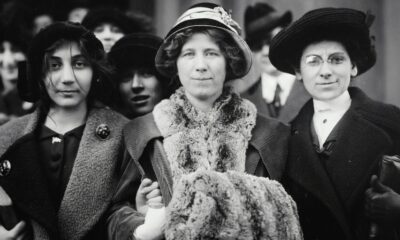
 Health & Fitness6 days ago
Health & Fitness6 days agoDiscover the Best Multivitamin for Women Over 40: A Comprehensive Guide to Optimal Health
-

 Crime6 days ago
Crime6 days agoExploring the Most Anticipated New True Crime Documentaries of 2025
-

 Business6 days ago
Business6 days agoMaximize Your Earnings with American Express High Yield Savings Accounts in 2025
-

 Gadgets & Electronics5 days ago
Gadgets & Electronics5 days agoTop 5 Unlocked Android Phones Under $100 for Budget Shoppers in 2025


